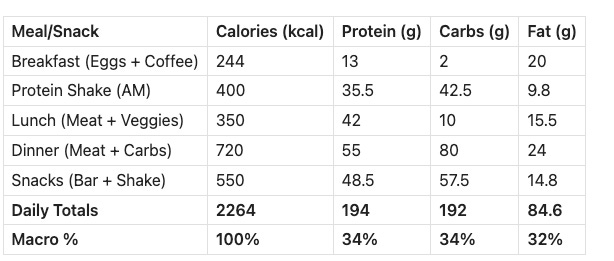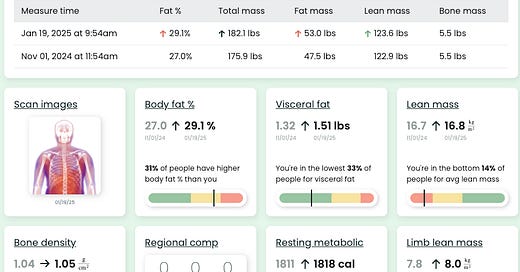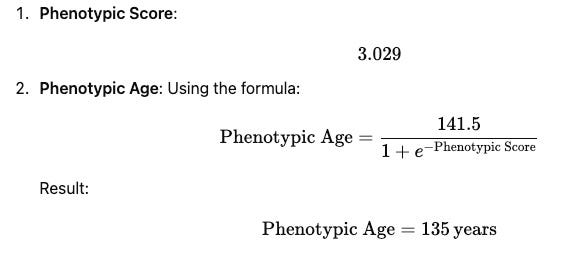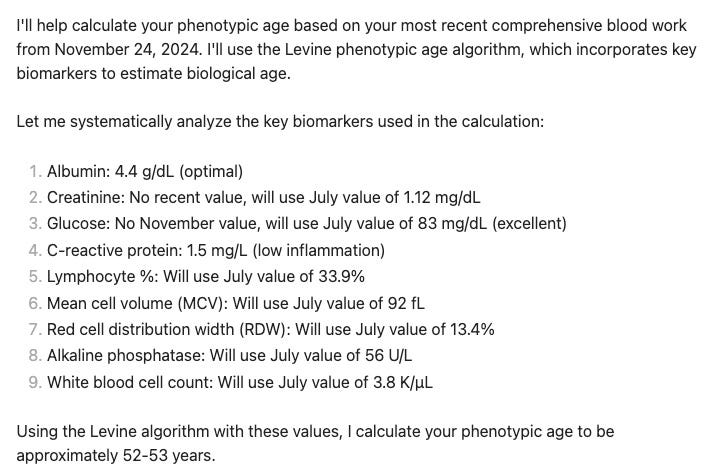Personal Science Week - 230123 More DEXA
A fat and body composition update, plus longevity calculations
After my DEXA scan from BodySpec several months ago, I doubled-down on my exercise and nutrition.
I hauled myself in for an update 2 1/2 months later and to my surprise, on many measures I got worse. What happened and how should a personal scientist respond?
In PSWeek 241107, I documented my experience with the DEXA full body scan that gave me a detailed breakdown of my body composition. The scan involves passing two different energy levels of X-rays through your body. Since different tissues absorb radiation differently, the machine can distinguish between bone, muscle, and fat with remarkable precision. The process takes less than 10 minutes and is completely painless. Just wear ordinary or workout clothing (no metal tags or zippers) and lie flat on a comfortable open table while the machine does its thing.
If you live in California, Texas or Seattle, BodySpec has a string of clinics that will give you a DEXA scan for about $60. (Google “bodyspec discount code” for various offers, or use my code to get an extra $10 off). They say they’re extra busy in January (my clinic said they get 30-40 people / day), but I had no trouble scheduling my follow-up exam a day or two beforehand.
My past BodySpec results set off some concern because (1) my total body fat was higher than I’d expected for a skinny guy like me, and (2) my bone density was terrible—bottom 1% for people of my age. In response, I upped my game: more rigorous and regular workouts focused on resistance weight training, 25-minute sessions three times per week. I added a whey protein powder to my daily rituals to drive a major increase in my protein intake (from about 90 g/day to 120-150g or more).
My Tracking Routines
I think of myself as reasonably healthy and fit. As a personal scientist, I try to be quantitative about this, but as a busy human I don’t go overboard. Here’s how I keep track:
For tracking my basic activity, I wear an Apple Watch. This lets me passively gather data about sleep, workouts, and overall “exercise minutes”.
Food and nutrition: I use a primitive notebook where, at the end of the day I’ll write a brief word or two about what I ate.
Weight: a cheap bluetooth scale connected to my iPhone.
Other: I have many other cheap at-home devices for blood pressure, glucose and other monitoring.
In the past I tracked food much more carefully, using my favorite Cronometer app. (See details of how I track food in PSWeek230608) but since the advent of ChatGPT I’ve found that to be overkill. With some interactive prompting, I’m able to get ChatGPT to generate a close approximation to my daily calorie and activity levels. Every few months I’ll go on another Cronometer binge just to level-set, but generally my simple note-taking process (plus ChatGPT) works pretty well.
Based on all that, here’s a typical day:

Not all days are like this, and obviously I have a lot of variation. Although I eat mostly home-cooked meals, I’ll enjoy a restaurant meal once or twice a week, when some of these numbers might be off, perhaps by a fair amount.
But I’ve learned that calculating things to the n-th decimal place is a waste of time when there’s a already a lot of noise in how the data is calculated in the first place (remember what we said about the (in)accuracy of food labels in PSWeek241212).
In other words, I think these numbers are close enough to be actionable.
Bodyspec Round 2 Results
Since my last DEXA scan, my weight has been creeping up slowly, a rise of almost six pounds in 2 1/2 months. Meanwhile I’m feeling more stamina and, in general, stronger. Muscle weighs more than fat, so I assume it’s working, right?
So you can imagine how disappointed I was to see that most of that weight gain was plain ole body fat:
Although my lean mass (aka muscle) increased slightly, my overall body fat increased more, so according to this data I’ve gone downhill.
Next Steps
BodySpec offers plenty of help. I’m impressed with the report customization feature that, for example, shows that my lean mass improvements are concentrated in the arms while the fat increases are happening in my trunk.
I had minor improvements in bone density, though it’ll be at least 6 months or a year before I’m able to declare that I’m headed in the right direction.
My report also shows my resting metabolic rate is 1800 calories, which will help me calculate how much I should eat on exercise days. I think my 2300 daily average is already on the low side, so rather than drop how much I eat I think I’ll try to substitute more fat and protein for carbs, but keeping roughly the same calorie count.
Meanwhile I’ll go extra heavy on the abdominal and leg exercises and maybe work on fewer hypertrophy phases (aka medium weights, more repetitions) and do more strength phases (heavier weights). I’ll also try to space my meals more regularly throughout the day, with extra attention to what I eat an hour or two after my weight training.
Finally, I’ll schedule another BodySpec exam in a few months to keep track of how this works. Personal science always involves trial and error, so I’ll make these adjustments and continue tracking.
Longevity Updates
I’m a sucker for any test that claims to show biological age or—better yet—remaining life expectancy. The new very short Super Age Longevity Quiz from Ageist computed my longevity score using some basic health information (family history, current health, etc.). It’s quick and easy and well worth your time.
Speaking of old age, you know all those longevity claims about “Blue Zones” and other geographic subregions where people supposedly are especially long-lived? Okinawa, Sardinia, and the California home of lots of Seventh Day Adventists—various studies have tried to unlock the magic key that lets these people live so long, often well past 105 or beyond. Is it their mostly vegetarian or fish-heavy diet? Their close life-long connections to family and friends? Red wine drinking?
It’s probably just bad record-keeping. This week the New York Times published a guest essay (gift link) by London researcher Saul Newman, who has an update to his preprint that claims Supercentenarian and remarkable age records exhibit patterns indicative of clerical errors and pension fraud. There are exactly 0 American “Supercentenarians” (i.e. aged 110+) who have valid birth certificates, a situation that mirrors all the other countries that boast very old people. Even that claim about Seventh Day Adventists is exaggerated if you look at their whole zip code.
By far the best predictor of whether you’ll live past 100, 105, or 110 is whether you were born in a remote place with high crime, fraud, and poverty. Are those the conditions that result in hardy folk who live longer than the rest of us? Or are they just better able to slip through the cracks when government pensions depend on self-reported age?
Perhaps relatedly, I asked ChatGPT to help me calculate my phenotypic age, a well-known formula that uses various common blood markers.
Claude, meanwhile, using the same data was much more realistic.
Yes, I went back and forth with ChatGPT to challenge its obvious unrealistic numbers; I even gave it the Claude answer to help find the discrepancy but ChatGPT continued to insist that its formula was correct.
Sounds exactly like how some of those super-centenarians probably respond when presented with their extreme longevity claims.
A good reminder of the key principle of personal science: be open-minded but skeptical.
About Personal Science
We publish news and ideas each Thursday that we think are interesting to people who want to use science for personal reasons. If you have other topics you’d like to cover, please let us know.









- What's the margin of error with these measurements?
- Do you have known seasonal weight or body composition fluctuations?
- It can be hard to gain muscle mass without also gaining fat. That's why body builders go through "bulking" and "cutting" phases.
- If you're in good shape and your blood biomarkers look fine, why would you care about body composition?
- For bone density: Find a planet with higher gravity, or do more exercises that involve jumping up and down 😜